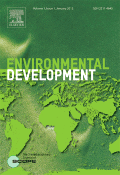
Environmental Development
Scope & Guideline
Innovating interdisciplinary approaches to environmental challenges.
Introduction
Aims and Scopes
- Sustainable Development Practices:
The journal emphasizes research on sustainable development practices that balance environmental integrity with socio-economic growth, including case studies and theoretical frameworks. - Climate Change Adaptation and Mitigation:
It covers methodologies and strategies for adapting to and mitigating the effects of climate change, particularly in vulnerable communities and ecosystems. - Environmental Policy and Governance:
The journal explores the effectiveness of environmental policies and governance structures in managing natural resources and promoting sustainable practices. - Community Engagement and Local Knowledge:
Research often highlights the importance of local knowledge and community engagement in environmental management and sustainable development initiatives. - Technological Innovations for Sustainability:
The journal showcases advancements in technology that contribute to sustainable practices, including renewable energy technologies, waste management solutions, and ecological restoration methods. - Socio-Ecological Systems Analysis:
It examines the interactions between social systems and ecological systems, focusing on resilience, vulnerability, and the impacts of human activities on the environment.
Trending and Emerging
- Climate Resilience and Adaptation Strategies:
There is a growing emphasis on research that explores climate resilience and adaptation strategies, particularly in vulnerable communities, to address the impacts of climate change. - Circular Economy Approaches:
The journal is increasingly publishing studies on circular economy practices, highlighting the importance of resource efficiency and waste reduction in promoting sustainability. - Interdisciplinary Approaches to Environmental Challenges:
Emerging themes include interdisciplinary research that integrates environmental science with economics, sociology, and policy studies to address complex sustainability challenges. - Impact of Technological Innovations:
There is a rising trend in exploring the role of technological innovations in enhancing environmental sustainability, including renewable energy, smart agriculture, and waste management technologies. - Socio-Ecological Systems and Governance:
Research on socio-ecological systems and governance structures is gaining traction, focusing on how governance can enhance resilience and sustainability in various contexts.
Declining or Waning
- Traditional Resource Management Practices:
Research focusing solely on traditional resource management practices has decreased, likely due to a growing emphasis on innovative, technology-driven solutions to environmental challenges. - Single-Dimensional Environmental Assessments:
There is a noticeable decline in studies that assess environmental issues from a single-dimensional perspective, as the journal increasingly favors integrated approaches that consider multiple factors and stakeholders. - Regional Studies with Limited Scope:
The focus on isolated case studies or regional analyses without broader implications has waned, as the journal favors research that contributes to global discussions and frameworks. - Historical Environmental Analysis:
Papers solely dedicated to historical environmental analysis without contemporary relevance or application to current sustainability challenges are becoming less frequent.
Similar Journals
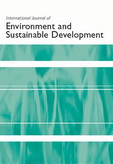
International Journal of Environment and Sustainable Development
Advancing knowledge for a sustainable future.The International Journal of Environment and Sustainable Development, published by INDERSCIENCE ENTERPRISES LTD, serves as a vital platform for researchers, practitioners, and policymakers engaged in the multidisciplinary fields of geography, renewable energy, and environmental sustainability. With an ISSN of 1474-6778 and an E-ISSN of 1478-7466, this journal has been disseminating critical research since its inception in 2002 and continues to expand its scope through 2024. Recognized within the Q3 quartile in Geography, Planning and Development and Q4 in both Management, Monitoring, Policy and Law and Renewable Energy, Sustainability and the Environment, it provides valuable insights into contemporary issues affecting our planet. While access options are limited to non-open access formats, the journal remains essential for those seeking to enhance their understanding of sustainable development practices and policies in a global context. The International Journal of Environment and Sustainable Development is not only an academic repository but also a catalyst for dialogue and innovation within the environmental sciences.
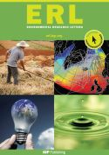
Environmental Research Letters
Innovating pathways to environmental resilience.Environmental Research Letters is a premier, peer-reviewed journal published by IOP Publishing Ltd based in the United Kingdom, dedicated to advancing the field of environmental science. With an impressive Impact Factor and consistently ranked in the Q1 category for its focus on Environmental Science, Public Health, and Renewable Energy, this open-access journal has been a vital resource for researchers and practitioners since its inception in 2006. Covering a wide scope of topics including sustainability, environmental health, and innovative energy solutions, ERL aims to promote discourse and disseminate groundbreaking research that addresses global environmental challenges. As a leader in the field, it holds prestigious positions in Scopus rankings, ensuring that published works reach a wide audience, thus driving impactful change. Researchers, professionals, and students alike will find valuable insights and essential knowledge within its pages, making it a keystone publication for anyone invested in environmental advancements.

One Earth
Championing impactful research for our shared planet.One Earth is a premier academic journal published by Cell Press, dedicated to advancing research in the fields of Earth and Planetary Sciences as well as Environmental Science. With an impactful presence in the academic community and an impressive ranking, One Earth has achieved Q1 status in both Earth and Planetary Sciences and Environmental Science, showing its commitment to the highest standards of scholarly excellence. Founded in 2019, this journal has quickly established itself as a leading platform for groundbreaking research, contributing to the global conversation on sustainability and environmental stewardship. With a distinguished Scopus rank placing it in the 99th percentile among Earth and Planetary Sciences and the 97th percentile in General Environmental Science categories, One Earth aims to disseminate cutting-edge findings and foster innovative approaches to address pressing global challenges. The journal is indexed with an ISSN of 2590-3330 and an E-ISSN of 2590-3322, supporting a broad audience of researchers, professionals, and students passionate about ecological integrity and planetary health.
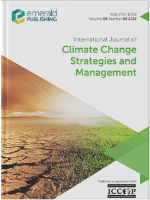
International Journal of Climate Change Strategies and Management
Advancing innovative solutions for a sustainable future.Introducing the International Journal of Climate Change Strategies and Management, a premier publication dedicated to advancing the understanding and development of innovative strategies addressing climate change. Published by Emerald Group Publishing Ltd in the United Kingdom, this journal has established itself as a trusted source within the realms of development, geography, and environmental science. With an impressive 2023 impact factor reflecting its high citation rates and a Q1 classification in pivotal categories such as Development and Geography, the journal stands at the forefront of climate change discourse. Since adopting an Open Access model in 2018, it has broadened its reach, making cutting-edge research accessible to a global audience. The journal encompasses a wide array of topics essential for academics and practitioners alike, focusing on management, policy-making, and methods for effective monitoring of environmental strategies. By fostering interdisciplinary dialogue, the International Journal of Climate Change Strategies and Management is essential for those aiming to contribute to sustainable solutions in our rapidly changing world.
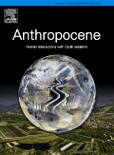
Anthropocene
Unraveling the Interplay Between Humanity and NatureAnthropocene, published by Elsevier Science Ltd, is a leading journal dedicated to the interdisciplinary study of the Anthropocene epoch, focusing on the profound impacts of human activity on Earth systems and ecosystems. With an impressive impact factor reflected in its Q1 rankings in Earth and Planetary Sciences and Ecology, as well as a solid standing in Global and Planetary Change, this journal is a vital resource for researchers, professionals, and students striving to understand and address the pressing environmental challenges of our time. Since its inception in 2013, the journal has been committed to publishing high-quality, peer-reviewed articles that stimulate critical discourse and inspire innovative solutions to complex ecological issues. Although not an open-access journal, Anthropocene provides extensive access options through institutional subscriptions, making its significant research readily available to the academic community. Based in the United Kingdom, the journal serves as a cornerstone for scholarship in a rapidly evolving field, bridging gaps across disciplines and encouraging interdisciplinary collaboration for a sustainable future.

European Journal of Sustainable Development
Connecting research with real-world sustainability challenges.European Journal of Sustainable Development, published by the European Center for Sustainable Development, serves as a vital platform for disseminating research in the interdisciplinary field of sustainability. With an ISSN of 2239-5938 and an E-ISSN of 2239-6101, the journal emphasizes the importance of advancing knowledge in areas such as environmental management, sustainable development policies, and socio-economic impacts on ecological resilience. Despite its recent discontinuation in Scopus, the journal has provided valuable insights within a broad scope of categories, including Geography, Planning, Development, and Environmental Sciences. Its current rankings reflect a challenging academic landscape but also signal the journal's potential for growth and impact within these disciplines. Although not an open-access publication, the European Journal of Sustainable Development encourages researchers and scholars to contribute and engage with pressing issues of sustainability, making it an essential resource for those dedicated to fostering a more sustainable future.
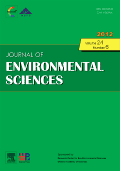
Journal of Environmental Sciences
Leading the Way in Multidisciplinary Environmental ResearchJournal of Environmental Sciences, published by SCIENCE PRESS, is a premier scholarly journal dedicated to advancing knowledge in the multidisciplinary fields of environmental science, environmental chemistry, and environmental engineering. Established in 1970 and based in Beijing, China, this journal has consistently garnered recognition for its high-quality research, demonstrated by its Q1 rankings across multiple categories, including Environmental Chemistry, Environmental Engineering, and General Environmental Science. With an impressive Scopus rank of #11 for Environmental Science, the journal has firmly positioned itself within the top tier of its field, attracting contributions from leading researchers and academics worldwide. Although it operates under subscription access, the journal's commitment to disseminating critical insights into pressing environmental issues makes it an invaluable resource for professionals, researchers, and students striving to make impactful contributions to the understanding and management of environmental challenges.

Euro-Mediterranean Journal for Environmental Integration
Uniting Voices for a Healthier Environment Across BordersThe Euro-Mediterranean Journal for Environmental Integration, published by SPRINGER HEIDELBERG, serves as a pivotal platform for interdisciplinary research in the realm of environmental science, particularly focused on the unique ecological and socio-economic context of the Euro-Mediterranean region. With its ISSN 2365-6433 and E-ISSN 2365-7448, this journal aims to foster a collaborative approach to environmental challenges, integrating insights from various fields such as ecology, geography, and sustainable development. Since its inception in 2016, it has made significant strides, achieving a Q3 ranking in Environmental Science and maintaining a notable position within the Scopus rankings, sitting at #102 out of 233 in the general environmental science category, which reflects its growing influence in academic discourse. The journal is committed to open dialogue among researchers, professionals, and students aimed at advancing knowledge and promoting innovative solutions to pressing environmental issues. Access to its comprehensive articles and findings will be key to contributing to a more sustainable future.

Environmental Policy and Governance
Fostering Interdisciplinary Dialogue on Environmental ChallengesEnvironmental Policy and Governance is a premier academic journal published by WILEY PERIODICALS, INC, based in the United Kingdom, dedicated to advancing the understanding and implementation of environmental policy across various governance frameworks. With an ISSN of 1756-932X and E-ISSN 1756-9338, this journal spans from 2009 to 2024, reflecting a rich history of contributions to the field. Renowned for its rigorous scholarship, it holds a prestigious Q1 ranking in both Geography, Planning and Development and Management, Monitoring, Policy and Law, positioning it in the top tier of academic discourse. The journal has made significant strides in promoting interdisciplinary research, fostering dialogue among policymakers, scholars, and practitioners, and addressing pressing global environmental challenges. Although currently not an Open Access publication, its high impact factor underlines its relevance and authority, making it an essential resource for researchers, professionals, and students eager to explore innovative solutions and best practices in environmental governance.
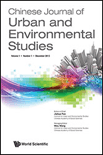
Chinese Journal of Urban and Environmental Studies
Fostering Interdisciplinary Solutions for Urban SustainabilityChinese Journal of Urban and Environmental Studies, published by World Scientific Publishing Co Pte Ltd, stands at the intersection of urban studies and environmental research, providing a critical platform for the dissemination of knowledge and innovative ideas in these increasingly vital fields. With an ISSN of 2345-7481 and E-ISSN 2345-752X, this open-access journal has been recognized for its significant contributions, achieving impressive quartile rankings, including Q2 in Urban Studies and Q2 in Geography, Planning and Development for 2023. As it converges from 2019 to 2024, the journal aims to foster interdisciplinary collaboration and to stimulate dialogue among researchers, professionals, and policymakers. With its focus on relevant socio-economic and environmental issues, Chinese Journal of Urban and Environmental Studies serves as an essential resource for anyone looking to gain insight into the complexities of urban environments and their ecological impacts, making it an indispensable addition to the libraries of those committed to sustainable development and urban planning.